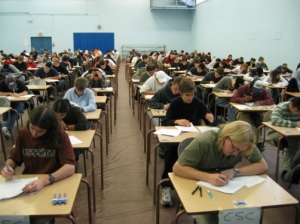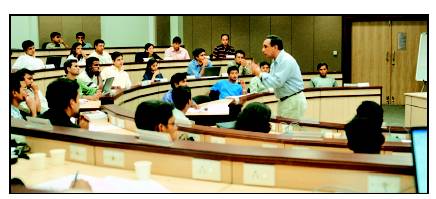(Assuming: Exam in this blog means written exam)
In a system, the basic components are: setting a goal, planning, strategy (selection of the best plan from the alternatives), implementation, evaluation and correction. This goes on in a cyclic matter in order to attain more and more perfection. Here evaluation is a critical component for those who consider continuous improvement in a process in the system. It is doing the gap analysis- how much is the actual deviated from the target? Hence evaluation cannot be ignored while measuring the performance of any system.
Exam is an evaluation for a student’s performance; his (her) learning. Marks are the tool for the evaluation. Thus these two are inevitable. But how much we should rely on exams and marks is a big question?
We can classify students into three categories.
- those who are very keen to learn
- those who are forced to learn
- those who will not learn even if they are forced to learn
For the first category, the evaluation process does not matter as they are always on track in terms of learning. Interestingly, the last category are also not worried about the evaluation process as they are pre determined not to learn anything or their interest may be in some other subjects other than what they are learning.
Here, the discussion is about the second category- those who are forced to learn. In a typical class, these students constitute more than 80% and are chances to bring them to the first category or they can fall to the last category. Exams are killing the real learning of these types of students.
Exams- mug up?
The second category students do not prepare well in advance. They usually burn the mid night oil, trying to mug up everything and attempt the exams. Yes, they will pass. But what is the learning here? Some times I feel exams are for memory test and are not examining the real learning. What is the point in conducting an exam- an evaluation process- which will not satisfy its real purpose? We are conducting or taking exams because the rule says so; for the sake of conferring a degree!
Better evaluation systems…
- Allow the students enough freedom with respect to the time period for taking exams: A degree should be conferred only after earning specific number of credits. But the Universities should drop the time period (typically 3 or 4 years for graduation and 2 years for post graduation, in India) within which one should earn the number of credits. Only when the student is thorough with a subject, (s)he should take that exam, whatever the time period (s)he is going to take.
- Test the knowledge of a student through application oriented questions in written exams
- A mix of written exams and viva-voce; focusing more on viva-voce.
Written exams vs. viva-voce
Written exams help a student to answer in a time frame. The student applies his/her strategy for the exams based on the time limit and the questions to be answered. It provides a structured way of answering and the strategy adopted will vary based on the question. Some times it tests the ‘writing ability/ writing capacity’ of the student, which is not the purpose. Written tests have the advantage of doing it parallel as one teacher can control a large number of students taking exams at a time and thus saves time.
Viva-voce tests how much a student is comfortable with the fundamentals and basic principles. It requires a logical thought process and clarity in thinking. Real evaluation can be carried out through viva-voce. Without beating the bush, viva-voce expects crispiness in the answer. But viva-voce consumes a lot of time as it happens on a one-to- one basis.
A combination of written exams- which tests the application of learned concepts- and viva-voce- which tests the clarity in understanding the fundamentals- may be a best method for evaluating the learning of a student.

